There it is: an idea for an online course that will help you build a six-figure passive income stream - what will you name it?
While a wise man once said that a rose by any other name would smell as sweet, a course by any other name will not always sell as well. Whether it’s a course, book, or info product, one of the keys to your success is coming up with a name that turns heads, catches the eye, and converts window shoppers into buyers.
Writing a catchy title also happens to be one of the most challenging tasks for every content creator and marketer. Your course title can mean the difference between someone not giving a second glance at your content and someone eagerly diving in to see what you have to say.
The following are some guidelines, tips, and formulas that will help you brainstorm a variety of titles for your new product or course. You’ll then need to pick the one that speaks directly to your target reader or customer and gets them to keep on reading or listening.
Why Choosing The Right Course Name Matters
Imagine scrolling through an online course catalog. Dozens of course names flash before your eyes, but only a few grab your attention. Why? Because a compelling course name is a beacon in a sea of mediocrity.
For business owners, especially those in service-based and coaching businesses looking to scale, the stakes are sky-high. Here’s why nailing the perfect course name is non-negotiable:
The right course name is more than just words; it's your course's identity, its first impression, and its promise all rolled into one. Business owners and coaches, here's your challenge: craft a name that’s not just good but unforgettably magnetic!
Steps to Choosing the Right Name for Your Online Course
As I said above, coming up with a catchy, attention-grabbing, show-stopping title can be one of the hardest parts of creating your course.
But that’s only if you don’t have a reliable process to follow. Crafting the ideal name for your online course is a blend of strategy, creativity, and a touch of intuition. While it might seem challenging at first, breaking down the process into manageable steps will make it both fun and fruitful.
Here’s a step-by-step guide to help you land on that perfect name:
Remember, naming your course is a creative process intertwined with strategic thinking. Embrace the journey, trust your intuition, and you'll land on a name that not only attracts but also truly represents the essence of your course.
Guidelines for Choosing the Right Name for Your Online Course
There’s no stopping you now! The step-by-step process above will get you far, but bear the following in mind as you brainstorm titles for your course.
These guidelines will help you stand out from the competition, de monstrate the value of your course, and make more sales.
Tips for Generating Online Course Name Ideas
Staring at a blank screen and waiting for it to magically change?
Been there, done that. Here are some tips to save your eyes the trouble (and hopefully prevent a headache):
When you have a list of possible titles, you can pick one main one for your course and use the others as blog posts to drive traffic.
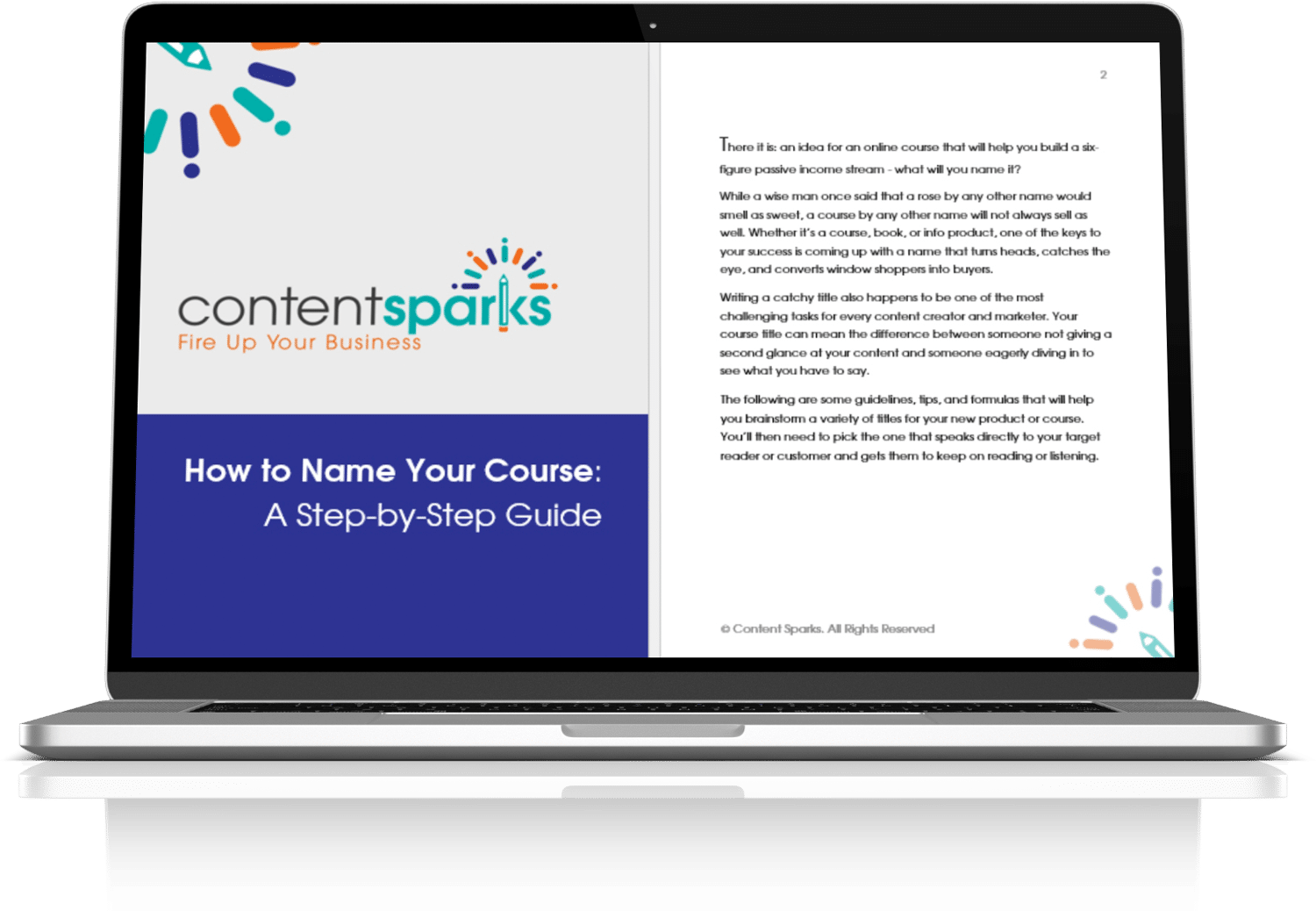
How to Name Your Course: A Step-by-Step Guide
Want a pdf copy of this guide, so you'll have it on hand every time you need to name your next course?
Formulas & Examples for Writing Course Names
The Power of 3
People are naturally drawn to things that come in 3's. Somehow the rhythm helps people remember. Think ‘3 key points', just like the maximum recommended for slides. If you can break down your title into 3, it will flow naturally, cover the essentials succinctly, and be remembered more easily.
Formulas:
- X, Y, and Z
- X and Y and Z
- X, Y, Z
Examples:
- Lions and Tigers and Bears
- Eat, Pray, Love
- Smarter, Faster, Better
- Friends, Romans, Countrymen
- Blood, Sweat, and Tears
- The Good, the Bad & the Ugly
- Lock, Stock, and Two Smoking Barrels
Tip: Just pick 3 key elements of your course or product and see how you can combine them. You can start by writing down one big list.
This and That
You can also use just 2 words, if it makes more sense for your content.
Formula:
- X and Y
Examples:
- Pomp and Circumstance
- Pride and Prejudice
- Sense and Sensibility
- Bait and Switch
Tip: Write down a big list of key words from your course, like you did for the Power of 3. Test out different combinations.
The Essence of It
A time-proven title formula, you'll see this everywhere. The idea is to boil down your course into the essence you're offering on a specific topic. For example, if your topic is ‘business mindset' and your core path to that is breaking mindset into 5 key behaviors that lead to change, then your title might be ‘The 5 Characteristics of a Winning Business Mindset.’
Formula:
- The X of Y
Examples:
- The Pursuit of Happiness
- The Power of Positive Thinking
- The Psychology of Success
- The 7 Habits of Highly Effective People
- The Perks of Being a Wallflower
Tip: This is a great one to get some interesting adjectives in there. Try to have fun with them!
Do This to Get That
Boil down your whole content piece into the one main thing you're teaching and the one big benefit.
Formula:
- [Verb] + [Main Benefit]
Examples:
- Think and Grow Rich
- Laugh and Be Happy
- Drink and Be Merry
- Stop and Smell the Roses
Tip: Focus on the verb and think about how it will be received by your audience since that’s what is going to draw people in first. Then think of the benefit in terms of the one big thing that people yearn for in relation to your topic.
Complete Guides
If your course or book is a how-to or comprehensive guide, you can use the word ‘guide' or even ‘bible' in the title.
Formula:
- The/Your [Adjective] Guide/Bible to [Doing Something or Getting a Result]
Examples:
- The Dummies Guide to [Just about everything]
- The Retailer's Guide to Email Marketing
- The Entrepreneur's Guide to Start-up Funding
- The Hitchhiker’s Guide to the Galaxy
Tips: Include your target audience to make it more specific than just a guide for the whole world. Use adjectives to spice it up and make the title stand out from all the other guides out there.
From Here to There
Similar to the ‘do this to get that' formula, you can also write a title that describes the transformation people will make or the journey they go on.
Formula:
- [Starting point] to [Benefit or Better State]
Examples:
- From Here to Eternity
- From Pauper to Prince
- From Failure to Success
Tips: This is a great formula for making use of customer survey data. Find out what people struggle with most and where they’d like to be. Those are your starting points vs. end result or better state.
Easy, Peasy
Anything that's made easy or simple for people is an attraction all on its own.
Formulas:
- [Topic] Made Easy
- [Result] in [number] Simple Steps
- [Topic] 101
- [Topic]: The Basics
Examples:
- Email Marketing Made Easy
- Boost Productivity in 5 Simple Steps
- Website Content Creation 101
- Guided Meditation: The Basics
Tips: Be specific about your topic. Don't just be about ‘blogging made easy', but identify who it's for. Such as ‘Mommy Blogging Made Easy'.
Reveal it All
People love to think they are finding out something that no one else knows. So try using words like ‘secret', ‘revealed', ‘exposed', ‘truth’, ‘myths’, etc.
Formulas:
- The Secrets of [Topic]
- [Topic] Revealed
- The Myths about [Topic] Exposed
- The Truth about [Topic]
Examples:
- The Secrets of Successful Real Estate Investors
- Easy Productivity Accelerators Revealed
- The Top 5 Myths about Buying a New Car Exposed
- The Unedited Truth about SEO
Tips for Catchy Course Names
Be careful not to over-hype your course title when it comes to secrets, hacks, tricks or other potentially misleading promises. If your tips are nothing particularly unique, don't promise to tell people something that no one has heard before. However, it's okay to talk about things that a large portion of your own target audience is unlikely to know about.
All of the formulas above are your starting point only. Once you’ve brainstormed your big list of title ideas and picked a few you like, take it a step further.
Use your trusty thesaurus to find where you could swap out one word for another, more interesting or powerful one. See if you can attach a timeframe for a specific result (only if you can back up that promise). Or try adding a little curiosity factor to your title by making the main title very short and intriguing, then adding a more specific promised result in a subtitle.

How to Name Your Course: A Step-by-Step Guide
Want a pdf copy of this guide, so you'll have it on hand every time you need to name your next course?
Online Course Name Generators
Need a little extra help? AI and tools can help you create a course title that's attractive to your audience.
This tool is quick and easy to use when you're lacking inspiration. Just add your keyword and click generate!
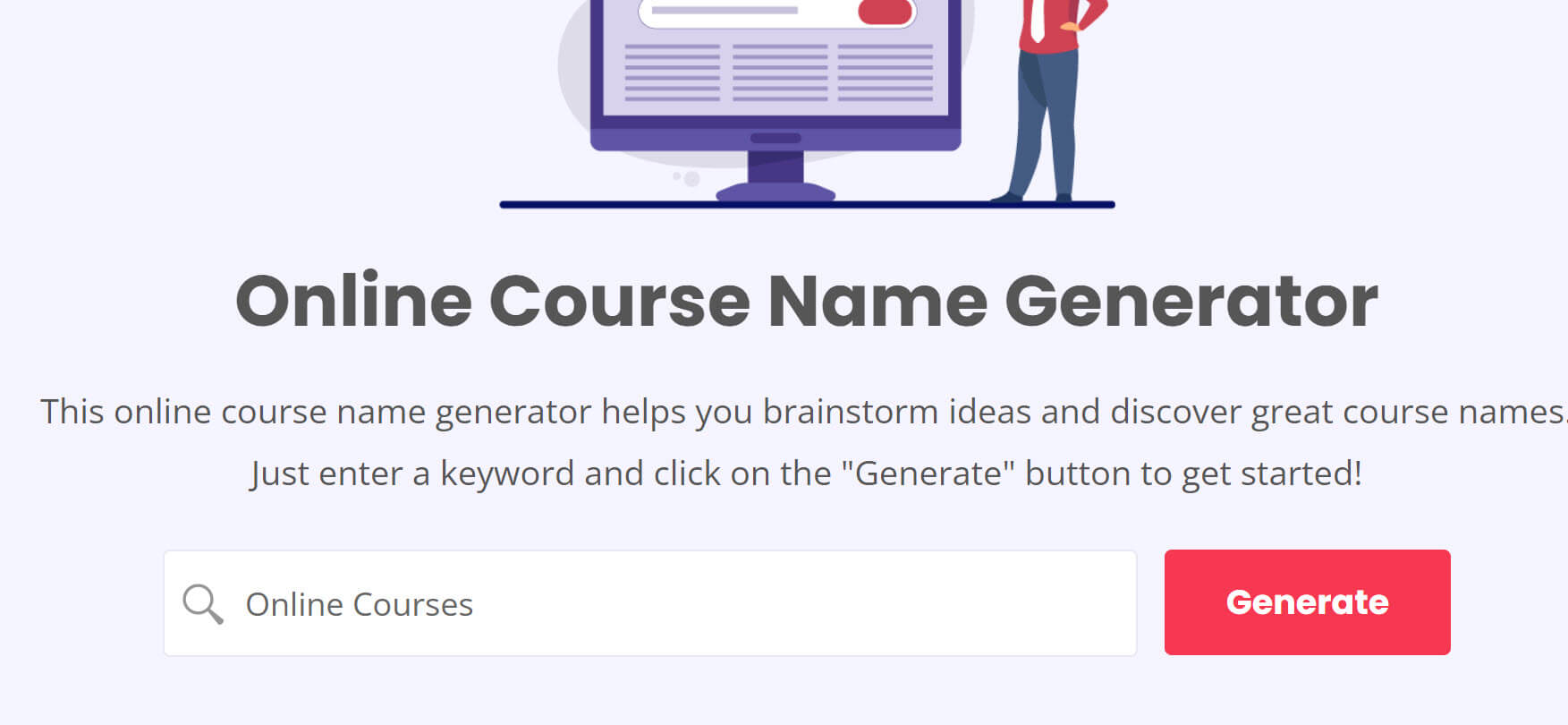
Within seconds we had 10 names based on on our keyword "Online Courses"
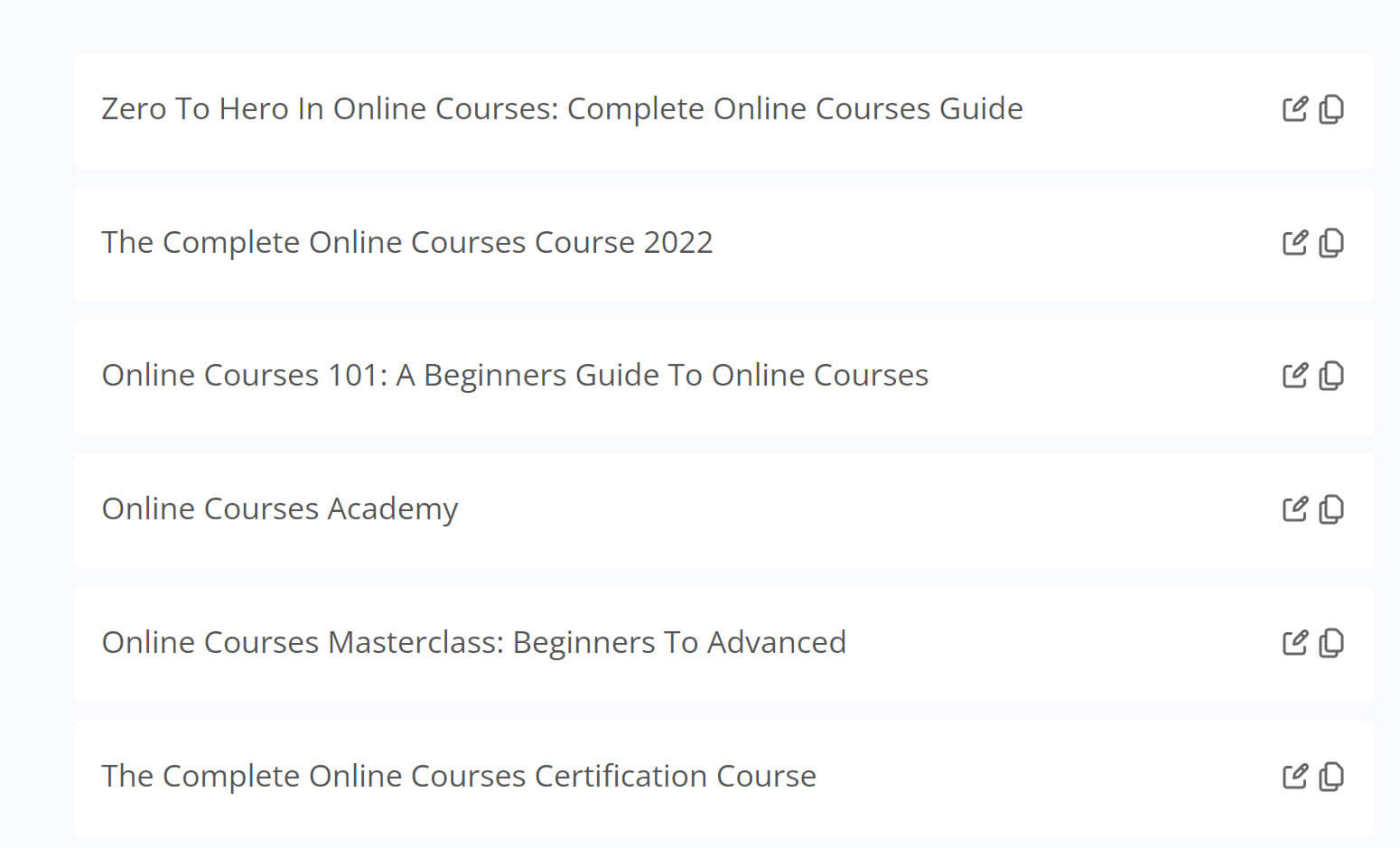
Business Name Generator
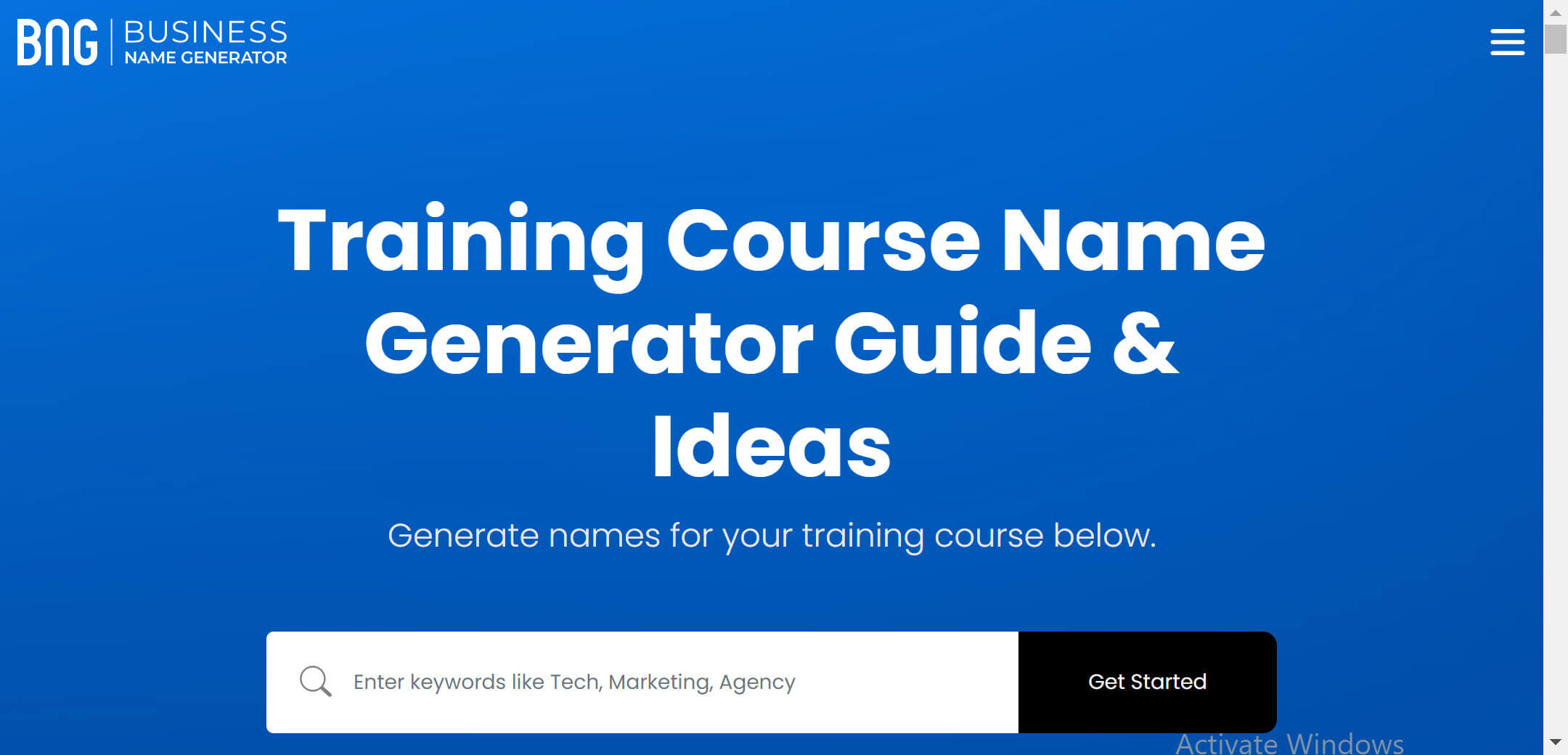
Again, simply add your keyword and click the generate button. Additional windows open advertising Go Daddy, and then you get your suggestions.
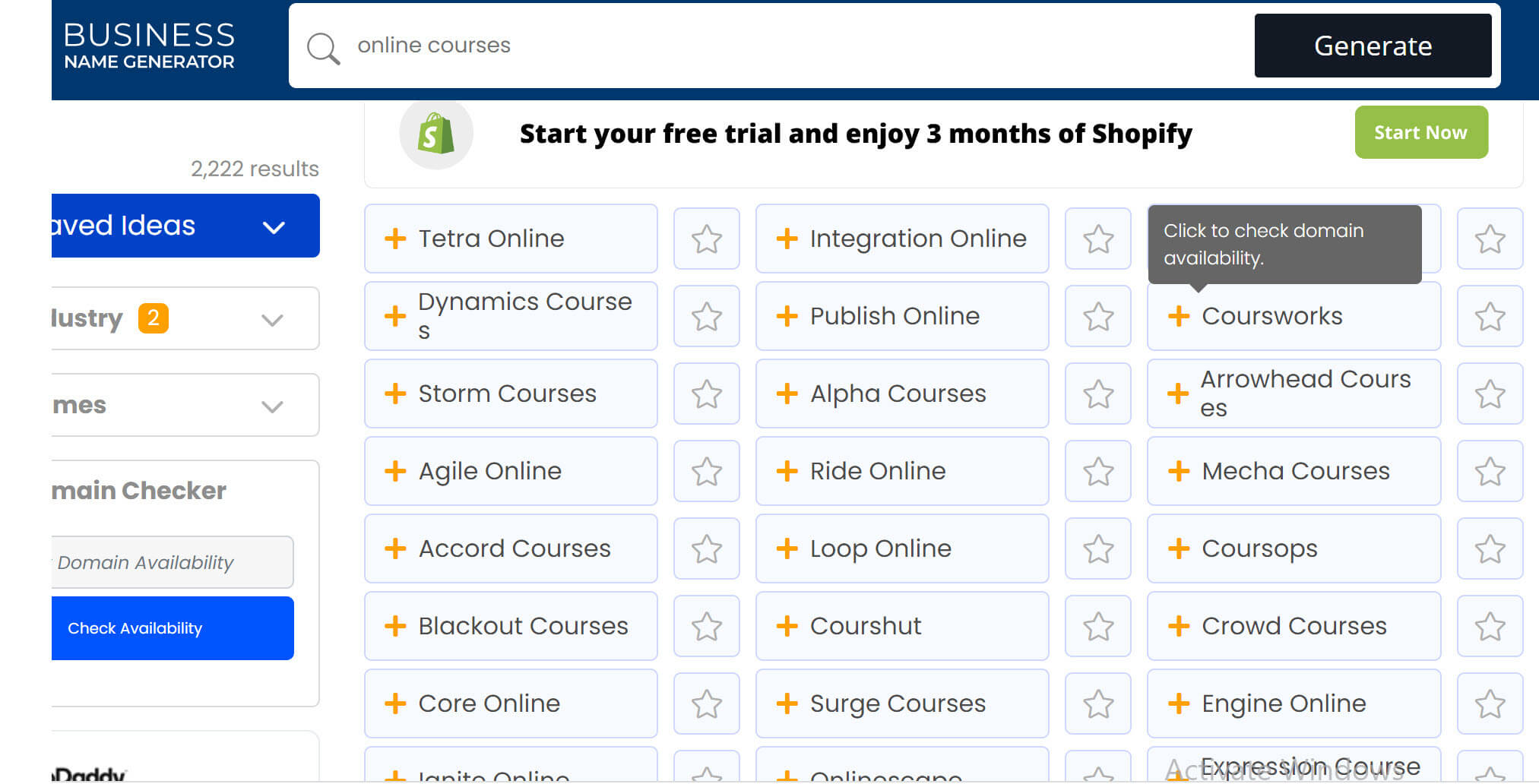
Comparing the two, at Content Sparks, we prefer the output of the Online Course Name Generator. The focus is on courses, whereas the Business Name Generator is the place you look for a brand name.
Our final tool for generating online course names is ChatGPT (the Plus version preferably)...
Chat Open AI
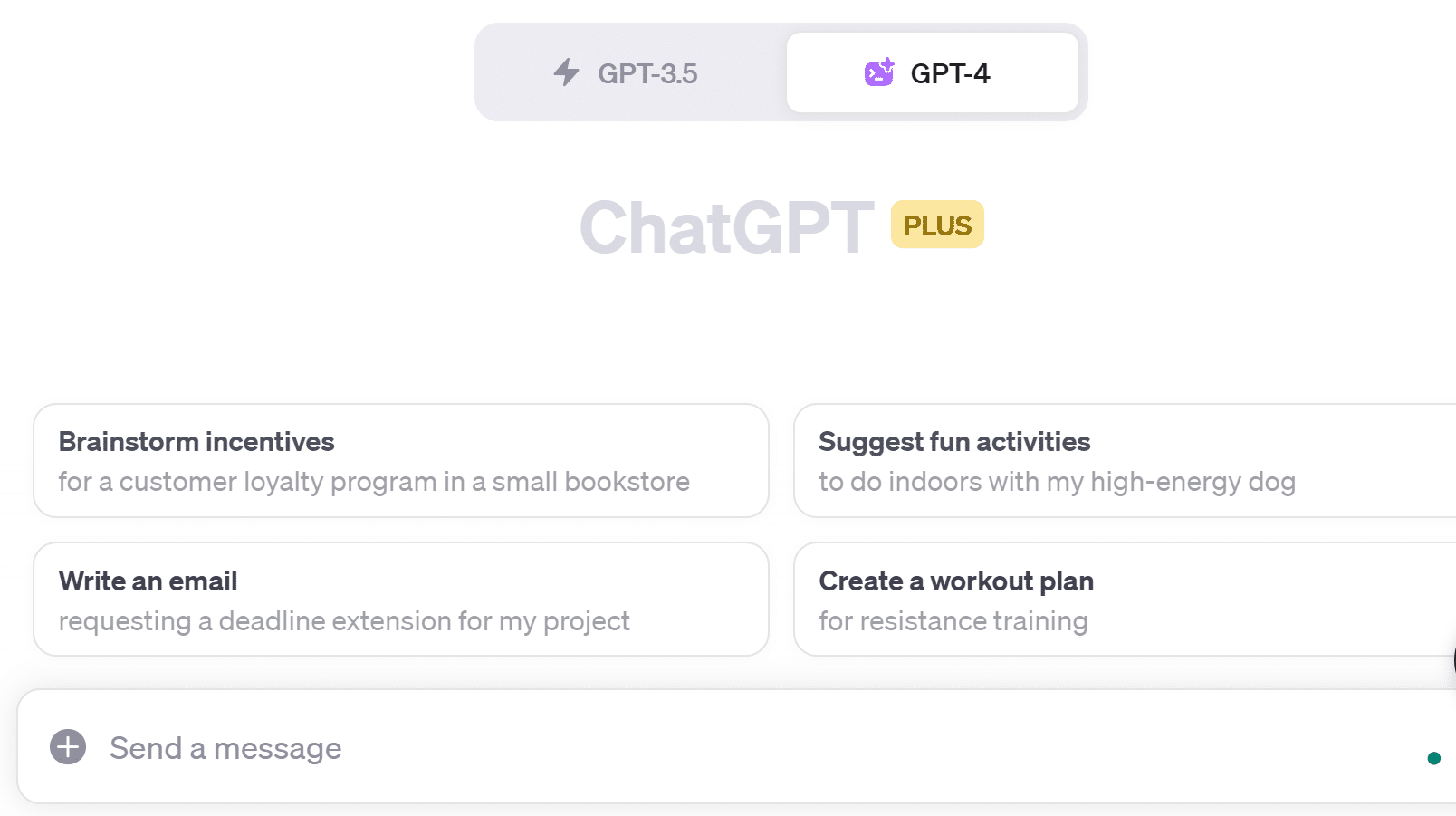
Simply type in your question, along with any guidelines about your audience, and watch the answers appear on screen as if by magic!
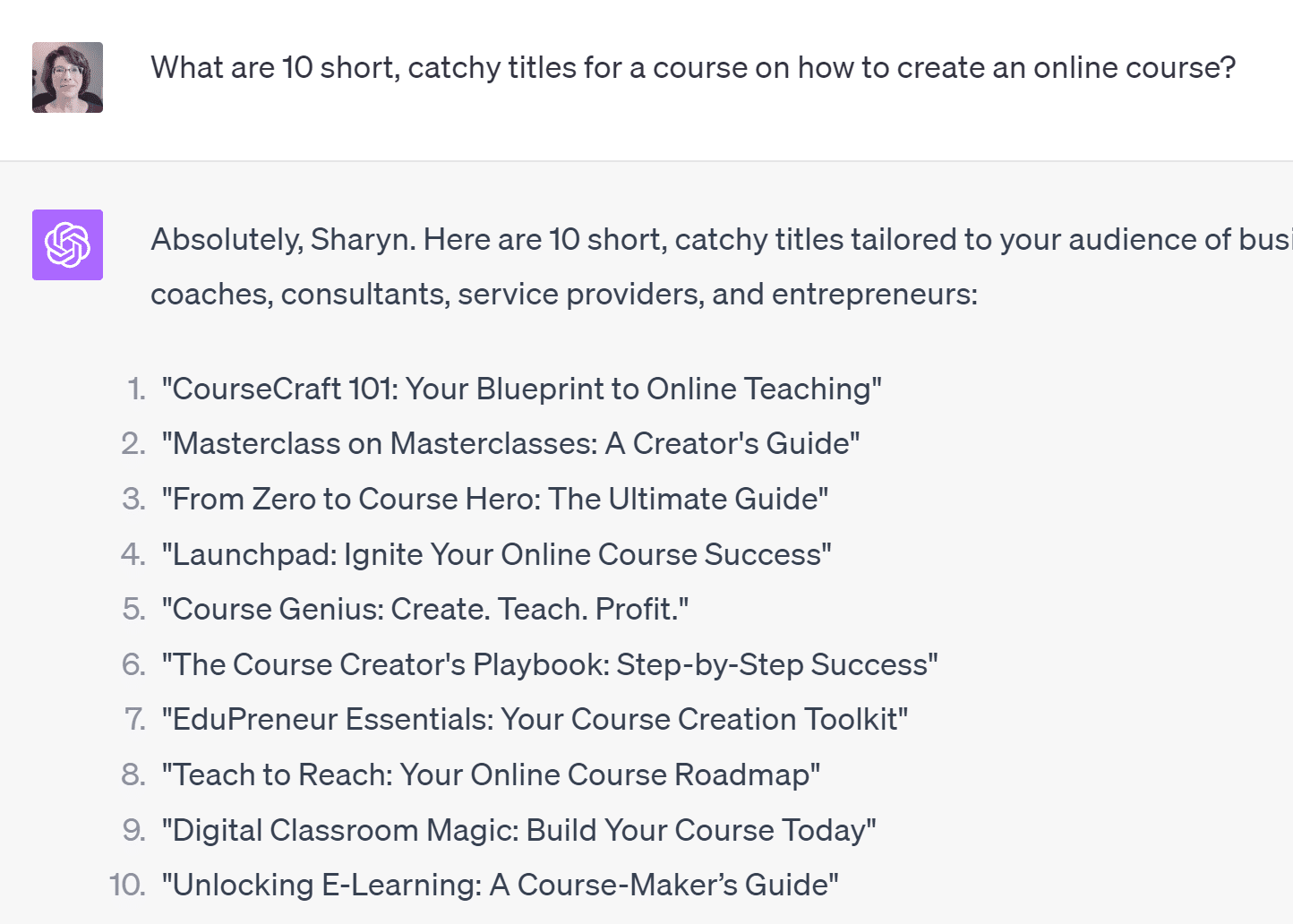
As you can see, some suggestions are a bit generic. But AI is a learning tool, and if you play around with it you can train it to get better results. I've already told ChatGPT my target audience and style in the Custom Instructions, so that's why it's attempted to write titles for them. I would then follow-up with more requests to refine the suggestions or come up with more variations of specific ones.
You'll see what tools you like best once you play around with them a bit.
Remember to download the pdf of this post, along with even more online course name ideas! Because you don't ever want to lose this article!
Here’s a Speed Hack - Have a Course Written for You
How about skipping the whole content creation process for your course and having it written for you?
Check out all the brandable, done-for-you courses that our team of professional instructional designers and writers has created here:
CLICK HERE to see available topics for launching your next course >>
When you purchase a license to any of our content, you get the ability to edit it any way you want, put your name and brand on, and share with prospects or sell for 100% profit.

Tags